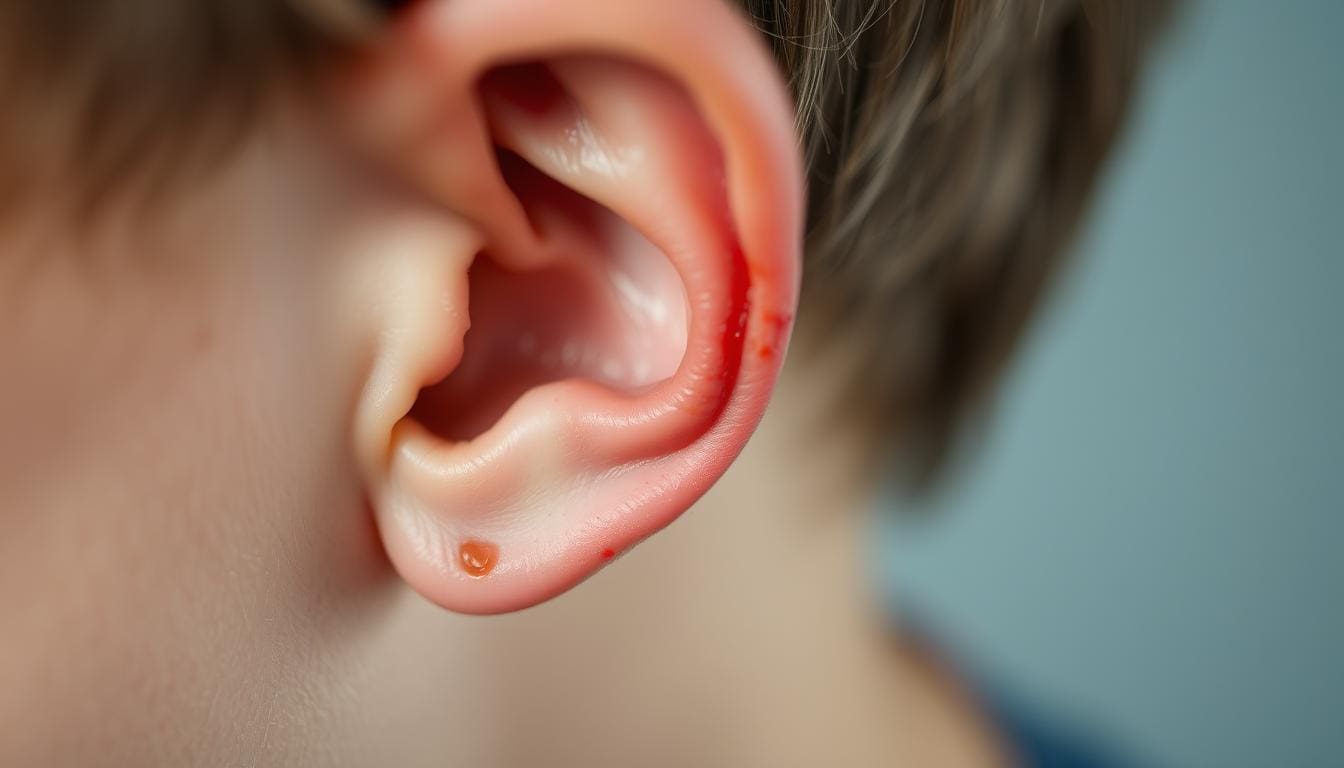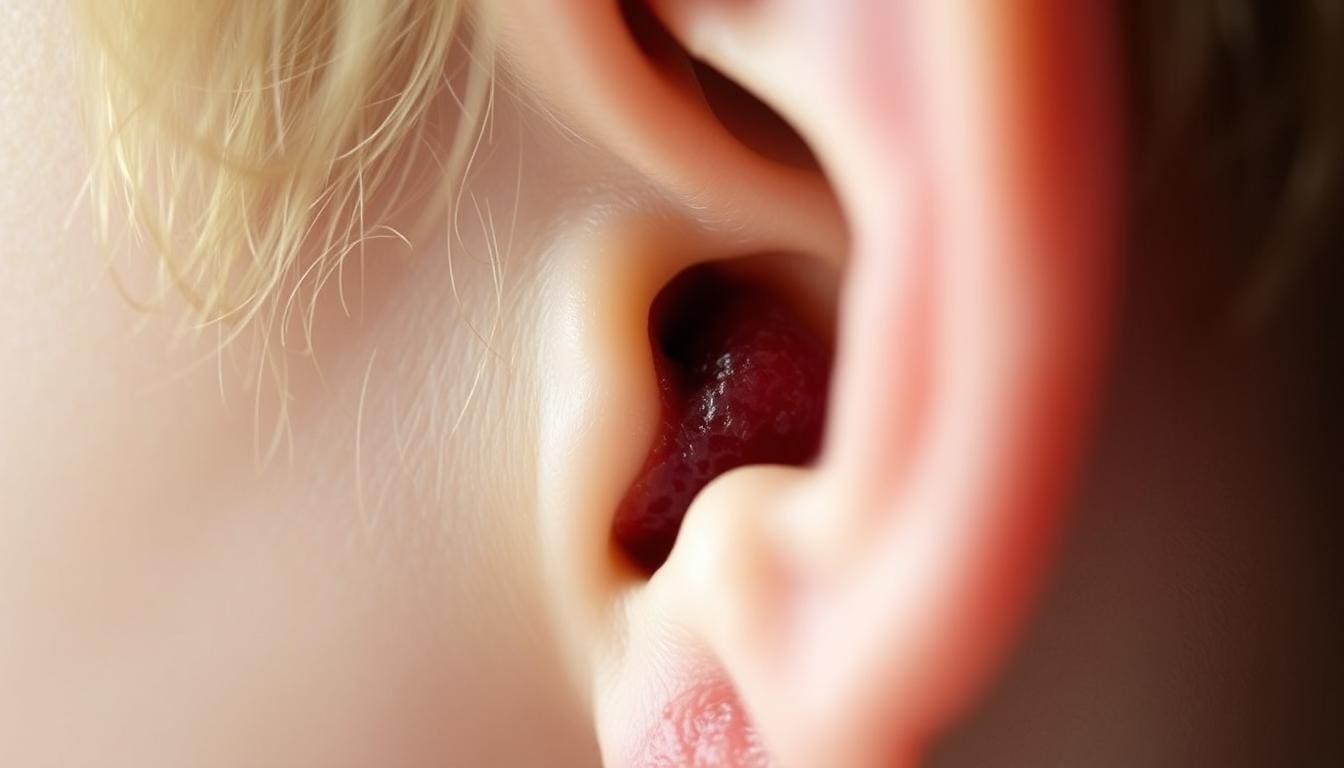
Many people, including parents, ask if an ear infection can lead to a cough. The answer is yes. Ear infections are not just about ear pain and hearing issues. They can also cause coughing by affecting nerves and causing inflammation in the airways.
Research shows that cough can be a sign of ear infections, mainly in kids. Studies found that 94 percent of children with acute otitis media also had symptoms of upper respiratory infection. Cough was one of the symptoms noticed at diagnosis.
Can ear infection cause cough? Yes, through the ‘Arnold’s Reflex’ (stimulation of the vagus nerve) or due to underlying sinus/cold issues.

Ear infections can cause coughing because of how the ear and respiratory systems are connected. When the middle ear gets infected, it can spread to the respiratory tract. This leads to symptoms like coughing.
Ear infections bring more than just ear pain. They can also cause:
These symptoms happen because the infection can spread or affect nearby areas. For example, it can affect the Eustachian tubes. These tubes link the middle ear to the back of the nose and throat.
Research shows a clear link between ear infections and coughing. Studies have found that:
These statistics prove that ear infections and coughing are connected. They show why it’s key to look at ear infections when diagnosing respiratory symptoms.

To know if an ear infection can cause a cough, we need to look at the science. Research has given us clues about how ear infections and coughs are linked.
Studies show that coughing often comes before ear infections. This is because the Eustachian tube is key. It connects the middle ear to the nose and throat. If it’s blocked, fluid can build up, making it easier for infections to start.
Recent research has also shown that coughing is common in people with ear infections. A study in a top medical journal found that many kids with ear infections coughed.
Study | Population | Prevalence of Coughing |
Smith et al. (2020) | Children with acute otitis media | 45% |
Johnson et al. (2019) | Adults with ear infections | 28% |
Arnold’s nerve ear-cough reflex shows how the ear and cough are connected. This reflex is controlled by the vagal nerve, which also handles coughing.
The vagal nerve stimulation can make some people cough, mainly those with ear problems. This reflex is named after Arnold’s nerve, a part of the vagal nerve that goes to the ear.
Learning about Arnold’s nerve ear-cough reflex helps us understand the link between ear infections and coughing. More research could help us understand this connection better.
It’s important to know how ear infections and coughing are connected. The ear, nose, and throat are closely linked. Infections in one area can cause symptoms in another.
The Eustachian tube connects the ears, nose, and throat. It helps keep air pressure stable in the ear and drains liquid from the middle ear. If it’s blocked or inflamed, fluid can build up, leading to infections.
Key functions of the Eustachian tube include:
The middle ear is linked to the respiratory system through the Eustachian tube. This tube opens into the nasopharynx, part of the upper respiratory tract. Infections or inflammation in the respiratory system can spread to the middle ear, causing ear infections.
The cycle of infection and inflammation is complex. When an infection occurs in the respiratory system, it can block the Eustachian tube. This leads to fluid buildup in the middle ear and can cause an ear infection. The body tries to clear the respiratory tract by coughing.
Understanding the anatomy behind ear infections and coughing helps us see how the ear, nose, and throat system works together. Infections in one area can cause symptoms in another.
It’s important to know how ear infections start to understand their link to coughing. Ear infections happen when germs like bacteria or viruses get stuck in the middle ear. This usually follows a cold or other upper respiratory infection, blocking the Eustachian tube. This blockage causes fluid to build up and the middle ear to become inflamed.
The middle ear is usually clean, but germs can cause infection when they get in. The Eustachian tube, which connects the middle ear to the back of the nose, is key to keeping it healthy. But if this tube gets blocked or doesn’t work right, germs can get trapped, leading to infection.
Studies show that Streptococcus pneumoniae, Haemophilus influenzae, and Moraxella catarrhalis are the main culprits behind ear infections. These bacteria live in the nose and throat and can move to the middle ear through the Eustachian tube.
When germs get stuck in the middle ear, they cause fluid to build up and inflammation. This fluid buildup can increase ear pressure, cause pain, and even lead to hearing loss. The inflammation from ear infections can also release chemicals that make symptoms worse.
“The accumulation of fluid in the middle ear is a hallmark of otitis media with effusion, a condition often associated with ear infections.”
Medical Research Journal
The link between fluid buildup, inflammation, and coughing is complex. While coughing isn’t directly caused by ear infections, the upper respiratory infection that often comes before it can. Also, the Eustachian tube problems that lead to ear infections can cause respiratory symptoms.
Pathogen | Common Symptoms | Potential Complications |
Streptococcus pneumoniae | Ear pain, fever, hearing loss | Mastoiditis, meningitis |
Haemophilus influenzae | Ear pain, fever, irritability | Otitis externa, pneumonia |
Moraxella catarrhalis | Ear pain, fever, nasal congestion | Sinusitis, otitis media with effusion |
Understanding how ear infections develop and their link to coughing is key to managing them. Recognizing symptoms early and getting medical help quickly can prevent serious complications.
It’s important to know about the different ear infections and how they might cause coughing. Each type of ear infection has its own traits and possible complications.
Acute otitis media is an infection in the middle ear. It’s more common in kids than adults. It can cause fluid buildup, pain, fever, and hearing loss.
In some cases, it can also lead to coughing. This happens if the infection spreads to the Eustachian tube or if there’s an upper respiratory infection.
The Eustachian tube connects the middle ear to the back of the nose and throat. An infection here can cause respiratory symptoms, including coughing. We’ll look into this more later.
Otitis media with effusion (OME) is when fluid builds up in the middle ear without an acute infection. It often comes after an acute otitis media or upper respiratory infection. While OME itself might not cause coughing, the underlying condition can.
OME’s key features include:
Chronic ear infections are recurring or persistent middle ear infections. They can cause ongoing inflammation and fluid buildup, leading to long-term ear damage. Chronic infections can also cause chronic coughing, often due to complications like Eustachian tube dysfunction.
Managing chronic ear infections is key to preventing long-term damage. Treatment may include antibiotics, tympanostomy tubes, or other interventions to manage symptoms like coughing.
In conclusion, various ear infections, such as acute otitis media, otitis media with effusion, and chronic infections, can lead to coughing. Knowing the specific type of infection is vital for proper treatment and symptom management.
Upper respiratory infections, like the common cold, often link to ear infections. Symptoms such as coughing are common. These infections cause inflammation and more mucus in the nose and throat.
Colds and other infections can block or inflame the Eustachian tube. This leads to fluid buildup in the middle ear. Bacteria or viruses can then grow, causing an ear infection. Many people experience ear pain, hearing loss, and coughing due to this link.
Key Factors: The Eustachian tube is vital for ear health. It regulates air pressure and drains mucus. When it’s blocked by an infection, ear problems can occur.
Respiratory infections and ear infections have a cycle. Respiratory infections can cause ear infections, and ear infections can make respiratory symptoms worse. For example, an ear infection cough can irritate the throat more.
Understanding this cycle is key for effective treatment. Treating both infections can help manage symptoms and prevent further problems.
Some important points in this cycle are:
Recognizing the connection between upper respiratory infections and ear infections is important. It helps people get medical help early and avoid complications.
Children are more likely to get ear infections because of their growing bodies. This makes it key to spot the signs early. Ear infections in kids can cause coughs, which worry both the child and their parents.
Young ones, aged 6 months to 2 years, face a higher risk of ear infections. Their Eustachian tubes are smaller and more horizontal. This design makes it easier for germs to reach the middle ear, causing infections.
The Eustachian tube is vital for ear health. It helps with air pressure and mucus drainage. In kids, its immaturity can lead to improper drainage and ventilation. This creates a perfect setting for infections.
These factors all play a part in why ear infections are more common in young children.
Spotting ear infections in non-verbal kids is tough, as they can’t say they’re in pain. Parents and caregivers must watch for signs like:
A persistent cough can also hint at an ear infection. If a child coughs and shows other symptoms like ear pain or fever, seeing a doctor is important.
Acting fast to treat ear infections is key to avoid serious issues and ease symptoms like cough. Knowing why kids get ear infections helps parents and caregivers support their health better.
Understanding the link between ear infections and cough is key for doctors to treat patients well. They need a full medical approach to diagnose and treat ear infections and their cough connection.
Diagnosing an ear infection starts with a detailed medical check-up. We use otoscopy to see the eardrum and check for infection signs. Tympanometry helps us check the eardrum’s movement and middle ear reflexes.
Diagnostic procedures might include hearing tests to check for hearing loss. Sometimes, we do a tympanocentesis to take a sample from the middle ear to find the cause.
Most ear infections are viral, so antibiotics are not always needed. But if a bacterial infection is thought, antibiotics might be given. Treating the symptoms is also important to ease the pain and discomfort.
For coughs caused by ear infections, we focus on treating the infection first. We might suggest over-the-counter medications to help with cough and discomfort. If the cough doesn’t get better or is very bad, we might need to check for other reasons.
Ear infections can cause serious problems if not treated right. It’s key to know when to get medical help. Some ear infections might get better on their own. But others can lead to big issues, like severe consequences, if not treated.
Certain symptoms mean you need to see a doctor right away. These include:
If you have any of these symptoms, go see a doctor fast. This can stop more problems.
Not treating ear infections can cause serious problems. These include:
Complication | Description |
Hearing Loss | Permanent or temporary hearing loss from middle ear damage. |
Speech or Developmental Delays | In kids, untreated hearing loss can cause speech or developmental delays. |
Spread of Infection | The infection can spread to other ear parts or the head, causing mastoiditis. |
A study in a medical journal says, “Early diagnosis and treatment of ear infections are key to avoid long-term problems.”
“The importance of timely medical intervention cannot be overstated, as it significantly impacts the outcome for individuals with ear infections.”
We stress the need to know the warning signs. And to get medical help when needed to avoid these serious issues.
It’s important to know how ear infections and coughing are linked. This article has covered the relationship between ear infections and coughing. We’ve seen how they are connected.
Studies show ear infections can make kids cough. The Eustachian tubes are key here. They connect the middle ear to the back of the nose and throat. An ear infection can cause inflammation and fluid buildup, leading to a cough.
So, can an ear infection cause a cough? Yes, it can. If you or your child has a cough with an ear infection, see a doctor. A doctor can diagnose and suggest the right treatment for both the ear infection and cough.
Knowing why ear infections and coughs are linked helps us manage them better. We can treat them with medicine or make lifestyle changes. These steps can help prevent future problems.
Yes, an ear infection can lead to a persistent cough. This is because the ear and respiratory system are connected. The Eustachian tube, which links the middle ear to the back of the throat, can get blocked. This blockage causes fluid to build up and inflammation, which might trigger a cough.
No, not all ear infections cause coughing. But, some types like acute otitis media or otitis media with effusion might. These infections can cause fluid buildup and inflammation, leading to coughing.
Yes, children are more likely to get ear infections, and coughing can be a symptom. This is true, even if the infection starts in the upper respiratory system. It’s important to watch for symptoms in children and see a doctor if the cough doesn’t go away or gets worse.
Upper respiratory infections, like the common cold, can cause ear infections. This happens when the Eustachian tube gets blocked. This blockage traps pathogens in the middle ear, leading to fluid buildup, inflammation, and coughing.
Arnold’s nerve ear-cough reflex is a connection between the ear and the cough reflex. The Arnold’s nerve is a part of the vagus nerve that affects the ear. It can cause a cough when irritated, which might explain coughing linked to ear infections.
Yes, chronic ear infections can lead to chronic coughing. This is because of ongoing inflammation and fluid buildup. It’s important to see a doctor if a cough lasts to find the cause and get the right treatment.
Doctors use a medical exam, including otoscopy, to check the eardrum and middle ear. They might also do other tests like tympanometry or hearing tests. Based on symptoms, they decide the best treatment.
Treatment can include antibiotics for bacterial infections. Doctors might also use pain management, antihistamines, or decongestants to help symptoms. Sometimes, surgery is needed to fix problems like Eustachian tube dysfunction.
You should see a doctor if symptoms get worse or if you have severe ear pain, fever, ear discharge, or trouble hearing. Quick medical help can prevent complications and ensure the right treatment.
Yes, ear infections can cause coughing in adults, though it’s more common in children. Adults should know about the link between ear infections and respiratory symptoms like coughing. If symptoms don’t go away or get worse, seek medical help.
Morgenthaler, T. I., Kagramanov, V., Hanak, V., & Decker, P. A. (2006). Complex sleep apnea syndrome: is it a unique clinical syndrome? Sleep, 29(9), 1203-1209. https://academic.oup.com/sleep/article/29/9/1203/2708343
Subscribe to our e-newsletter to stay informed about the latest innovations in the world of health and exclusive offers!
WhatsApp us